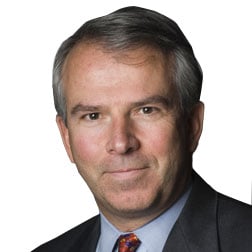After weeks of speculation, former Celgene CEO Bob Hugin is confirming that he’s left Big Pharma to enter politics. Tuesday, he's announcing his candidacy for the U.S. Senate at two events in New Jersey, according to a campaign-kickoff schedule sent to members of the press.

An active Trump supporter, Hugin is running as a Republican, aiming to unseat the sitting Democrat, Bob Menendez, whose tenure has been wracked by bribery allegations.
The prospect of a pharma veteran running for Congress has been met with a mix of optimism and scorn. Some industry insiders envision Hugin as a potential ally in the Senate, who can use his expertise to counter efforts to legislate limits on drug costs and placate a president who famously accused the industry of “getting away with murder” on pricing.
But his senate run worries pharma critics, who point to Celgene’s history of price hikes as a sign that the candidate will put the brakes on any plan proposed to restrict pharma pricing freedom. The company's multiple myeloma drug Revlimid has continually gone up in price, and it's expected to haul in more sales than any other cancer drug in the world in 2022.
RELATED: The top 15 best-selling cancer drugs in 2022—Revlimid
“I intend to do everything in my power to be sure people in NJ know that Bob Hugin made millions by exploiting people fighting cancer and taking advantage of poor people on Medicare,” said cancer patient and activist David Mitchell in an email to FiercePharma. Mitchell has been fighting multiple myeloma and contends that in the six years he took Revlimid, his copay rose from $42 for a four-week supply to $250. Mitchell called Hugin a “robber baron” and a “a ruthless and unscrupulous businessman.”
Last week, Mitchell started a new organization, Patients for Affordable drugs NOW, and vowed to devote “seven figures” toward funding midterm election candidates who support reforms to “our broken drug pricing system,” according to a statement.
The only thing that can be said for certain is that Hugin has a decent chance of grabbing Menendez’s seat, even in the deep-blue state of New Jersey. Menendez had been fighting corruption charges brought by the U.S. Justice Department, but the case ended in a mistrial late last year and was later dropped. Still, the scandal left enough of a stain that voters could very well decide to send a Republican to the Senate for the first time in more than four decades.
Hugin is an ally of Donald Trump, having served as a New Jersey delegate at the GOP convention and an attendee of a widely covered meeting between the president and pharma CEOs last January. During that confab, the president urged the executives to lower drug prices, boost innovation and move jobs back to the U.S.
RELATED: Trump's pharma CEO confab: Get prices 'way down,' get 'better innovation' and get back to U.S.
Celgene’s track record on those issues, though, is questionable. Celgene has two manufacturing plants in Switzerland that produce its blood cancer drugs Revlimid and Thalomid. It’s holding a whopping 78% of its cash overseas—about $6.9 billion—landing it at No. 20 on Bloomberg’s recent list of companies with the largest percentage of cash held overseas.
The company has not vowed to add jobs in the U.S., as the president was hoping the recently passed business-friendly tax package would spur companies to do. Instead, it’s laying out $9 billion to buy Juno, and when its stock dipped last year, it embarked on a share-repurchase program.
During a conference call with investors after its recent earnings announcement, Celgene CFO Peter Kellogg said that the company’s “return on invested capital” analyses suggested that buying back shares has “been a fantastic investment in a great way to return cash to shareholders for the company” and that Celgene would continue “to return cash to shareholders in the most advantaged way possible.”
RELATED: Celgene takes its most aggressive price hikes yet on Revlimid, Pomalyst: analyst
But it’s the price increases on some of Celgene’s biggest drugs that have some critics dreading the prospect of Hugin in the Senate. Last year, the company raised the price of Revlimid three times, amounting to a nearly 20% price hike for the year, and it increased the cost of its cancer drug Pomalyst twice, which resulted in a 17% price jump on that product for the year. SunTrust analyst Yatin Suneja estimated at the time that the increases would generate an additional $80 million in sales for Celgene in 2017.
Cancer patient Mitchell is planning to do everything he can to draw attention to Celgene’s history of price hikes under Hugin’s leadership. “As people in New Jersey learn more about Bob Hugin, I feel certain he will face vigorous opposition and ultimate defeat,” Mitchell says.
Not everyone is convinced that having a former Big Pharma CEO in Congress would be so bad, however. “It would be great for the drug industry to have one of its own in the senate explaining the industry’s dynamics, finances, challenges and opportunities,” Leerink analyst Geoffrey Porges told Stat. Ultimately, of course, it will be up to New Jersey's voters to decide whether a Trump ally—who nevertheless is a veteran of one of the state's biggest industries—is the right choice.